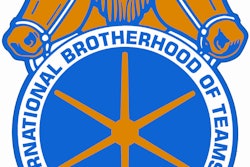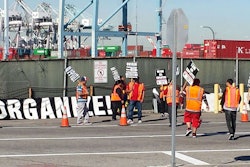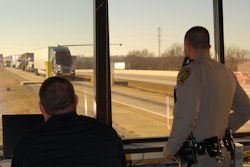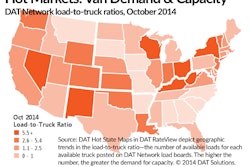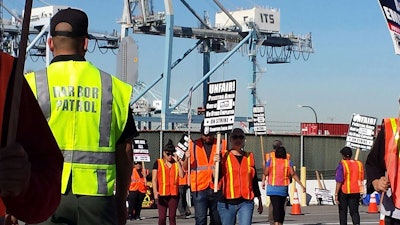 Drivers picketing at the Port of Los Angeles last week.
Drivers picketing at the Port of Los Angeles last week.Southern California drayage truckers have ended their latest strike, but little immediate relief will be felt in area ports, where union dockworkers will not resume “big table” contract talks until Dec. 1.
Late last week, truckers for five area carriers ended a four-day work stoppage. On Nov. 21, Pacer Cartage and Harbor Rail Transport truckers issued an unconditional return to work after QTS Inc., LACA Express, and WinWin Logistics truckers went off strike a day earlier.
The protests began Nov. 13 with Total Transportation Services Inc., Pacific 9 Transportation and Green Fleet Systems. That evening, GFS drivers agreed to extend the cooling off period negotiated by Los Angeles Mayor Eric Garcetti last July. TTSI and Pac 9 drivers resumed discussions with company management the next day.
This latest series of protests is the fourth for some Los Angeles and Long Beach drayage truckers in less than a year. The Teamsters union says the companies have misclassified the truckers as independent contractors instead of employees and have attempted to interfere with unionization efforts.
The Pacific Maritime Association has accused the International Longshore and Warehouse Union’s of using “slowdown tactics” after their contract expired July 1.
The association of terminal operators and shipping companies says productivity in some ports has dropped at least 30 percent.
The PMA began negotiations in May over the contract affecting dock and clerical workers at 29 Pacific Coast ports. The union recently refused a temporary contract extension, although it agreed to one last summer.
The association said the ILWU expanded slowdown efforts last week when it announced only subcommittees would meet and subject matter would be limited until after the Thanksgiving weekend. The ILWU also held a safety shutdown Nov. 20, which closed all San Francisco Bay Area ports, including Oakland.
Some major business organizations and West Coast congressional members want President Obama to appoint a federal mediator to the negotiations. Last week, White House Press Secretary Josh Earnest indicated he did not know if the administration had discussed stepping into negotiations.
When the trucker strike began, some containers lines announced plans to implement congestion surcharges as much as $1,000 per 40-foot container at Pacific Coast ports.
Soon after, reaction from Federal Maritime Commission resulted in some of these companies postponing this charge. The commission said some of these companies had not provided sufficient notice and explanation as required by law before such a surcharge could be implanted.
FMC Commissioner William Doyle also noted port congestion is caused by more than labor unrest.
Facilities have expanded to accommodate increasingly larger ships. Additionally, to reduce costs, many ocean carriers curtailed a a half-century practice of supplying chassis for truckers. Most companies ended the practice three years ago, resulting in chassis shortages and dislocations at major gateways, Doyle said.

